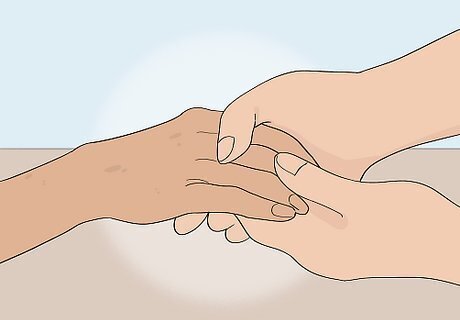
views
- Generational curses are negative habits, behaviors, and circumstances that are believed to be passed down from parent to child.
- To break a generational curse, reach out to your family members to get a better idea of it, then seek professional help from a therapist, if you’re able to.
- While you’re breaking the curse, treat yourself kindly, affirm that you’ll be successful, and extend forgiveness and grace to yourself and your family.
What is a generational curse?

Some Christians believe that curses from God are inherited. In Exodus 20:5, God commands believers to not worship any other God or idol, or else the sinful nature of the parent will be passed down 3 or 4 generations. If you follow God, however, thousands of generations will be blessed. With this mindset, generational curses can be considered the lasting effects of someone’s particular sin. For example, if a distant ancestor began to abuse their children, those children are likely to carry on that “sin” of abuse. When people believe in generational curses through the lens of religion, they often consider hereditary mental and physical ailments curses, as well.

Generational curses can be traits children get from their environment. While genes make up a big determining factor in what kind of person you’ll be, your environment is just as important. Habits that parents have can be passed on to children, including negative ones. For example, if your parents are smokers, you’re more likely to pick up smoking. Another type of generational curse is violence. When children are exposed to violence in their family life, they’re more likely to enact it on other people, as well.

Generational curses can be mindsets that parents instill in children. If your parents always doubted their own abilities to succeed, you’re likely to pick up that mindset, as well. Children’s brains are far more malleable than adults, so minor things can end up having major influences. If your parents constantly fought with each other, for example, you may have learned that anger is the appropriate response to conflict. Since some believe generational curses come directly from sins, some curses are just the playing-out of those sins. For example, idolatry. If your family cares about money more than anything else, you’re more likely to also have money as a top priority, as opposed to family or spirituality.

Generational curses are the results of generational trauma. More often than not, curses and bad habits are formed in response to negative circumstances. For example, people may abuse substances to escape a painful reality. Chronic poverty, which is also considered a generational curse, can be the result of experiencing societal discrimination, such as racism. Because of this, some generational curses require a constant battle to be broken. If you’re experiencing prejudice that goes beyond your family, consider getting involved in social action, and seek out communities that have similar experiences and can offer support.
Breaking Generational Curses

Pray for guidance and forgiveness (Christianity). Since the idea of generational curses is heavily linked to Christianity, some people use prayer as a way to address it. If you choose to pray, ask God to forgive your family for past sins, and accept Jesus and the Crucifixion as your method of redemption. A prayer could be something like “As I accept Jesus’s sacrifice as an atonement for my and my family’s sins, his blood erases the curse of my blood. His mercy extends through my family and absolves us of sin, and I give thanks for Jesus’s blood as a barrier the curse cannot pass through.”

Speak to family members to determine what behaviors are the “curse.” Generational curses, or bad habits, are ancestral patterns of behavior that happen without conscious thought, so look for repetitive habits that your family members seem to do naturally. Speak to other family members that you trust to find out about their experiences with the behavior. Just because you see repeated traits in your family doesn’t necessarily mean you have a generational curse. No matter what ancestral patterns your family may have, you always have the ability to improve yourself. Write down everything that you learn to make it easier to convene with your family. Write what you want to change in yourself, where you want to be in the future, and what you see other family members doing. Be as respectful as possible. Some people don’t appreciate having their bad habits pointed out and can be sensitive to discussing them. Don’t be accusatory, and frame everything through “I” statements.

Seek out a therapist or counselor to address the issue. Ancestral patterns can be difficult to break alone, but trained mental health professionals are an excellent resource to lean on. Consider involving a family therapist, if other people are open to it, to try and address the problem further generations back. Generational curses that can be treated by a therapist include substance abuse, physical/emotional abuse, and mental illnesses like depression and anxiety disorders. If you’re experiencing abuse at home, report it to the domestic violence hotline, and find a safe person to stay with, if you can. If you’re a practicing Christian, speaking to a priest, reverend, or any trusted religious leader can also help you overcome a generational curse.

Speak to yourself in a kind, supportive way. Having a generational curse can mean that you view yourself in a negative light—trauma can cause people to repeat negative things to themselves. Practice affirmations to boost your confidence and start changing your mindset. Some affirmations you can try are “I’m strong enough to stay sober,” “I will be the last person to carry this curse,” “I feel good when I don’t smoke,” or just “I am a success story.”

Replace your old habits with new, positive ones. Humans are creatures of habit, and it can be hard to just “remove” something from your life. Break a habit by avoiding tempting situations and starting new, healthy habits. Visualize your success to give yourself confidence, and imagine scenarios where you don’t do the old behavior. For example, if you go outside to smoke a cigarette every morning, consider going on a short walk instead, or satiating your oral fixation with toothpicks or gum. Avoid situations that encourage your habit if you can, but if you can’t, prepare yourself by imagining being in that situation without resorting to your old behavior. Imagine getting into disagreements while staying cool and collected, hanging out with friends who drink without drinking, or going to a store without buying unnecessary items, for example.

Forgive your family members for how the curse affects them. If you’re experiencing a generational curse, there’s a decent chance you’ve been hurt by the ways it affects your family members. Forgiveness is ultimately for you and your own peace of mind, so even if they don’t apologize, consider letting go of what has happened in the past. Forgiveness can take time and that’s okay. Prayer can be a way to help you forgive—it works similarly to affirmations. Ask God to help you forgive yourself and others. You could say: “God, please give me the strength to forgive those who have hurt me. Please lift me above anger, and help me look at those who have wronged me as your children, just as I am your child. Forgive them for me when I cannot, and forgive me when I stumble. Let the Holy Spirit work through me and fill me with your love and peace, free me from bitterness, and open my heart. Amen.” After forgiving, decide to renew or release your relationship. Just because you’ve come to terms with the fact that people can cause harm without being negatively intentioned or “bad” doesn’t mean you need to keep them in your life. Release toxic relationships with love. Involving other family members in the healing process can also be very helpful, especially those who seem to share your curse or those you have reconciled with.

Be patient with yourself when you make mistakes. Whether it’s a curse or a habit, behavioral patterns take work to break. Be patient with yourself—progress isn’t linear and if you find yourself slipping back into old habits, try to get back on the wagon without giving yourself a hard time. You can do this!



















Comments
0 comment